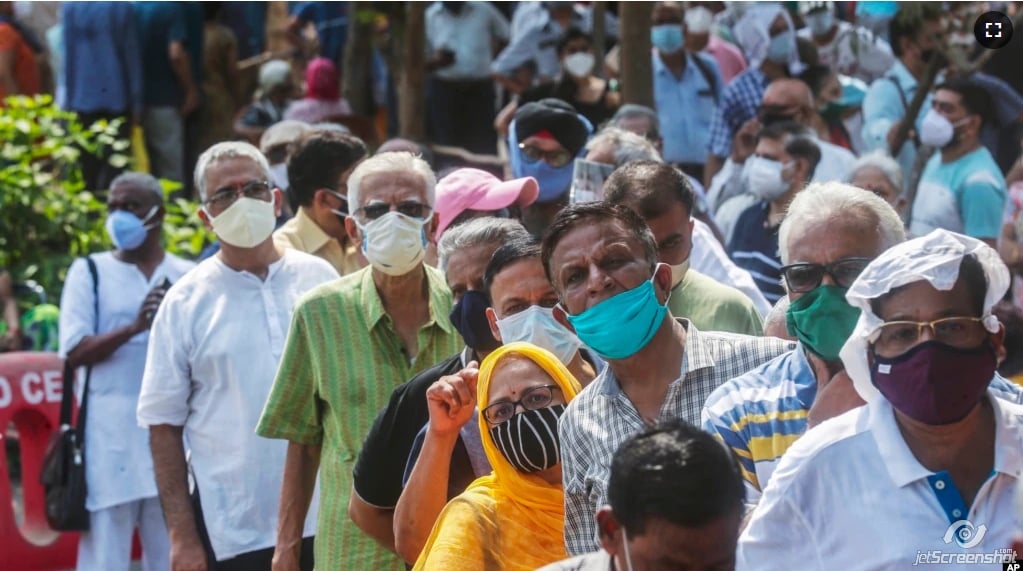By William Echols, for Polygraph
Gaurav Pandhi
A Congress party leader
“[T]he Modi Govt has admitted that COVAXIN consists Newborn Calf Serum. This is heinous! This information should have been made public before.”
Source: Time Now Twitter account, June 16, 2021
FALSE
As a second wave of infections starts to recede, India remains among the countries worst hit by the COVID-19 pandemic.
According to the World Health Organization, from January 3, 2020, to June 17, 2021, India registered nearly 30 million confirmed cases of COVID-19 and almost 380,000 deaths.
Only 239 million COVID-19 vaccine doses have been administered in the country of nearly 1.4 billion people, which aims to have 516 million vaccine doses on hand by July and more than 2 billion by year-end.
That would include 750 million doses of the AstraZeneca/Oxford COVID-19 vaccine, which India authorized for emergency use. Called Covishield in India, the vaccine is being manufactured by the Serum Institute of India.
India’s government is also banking on 550 million doses of Covaxin, which is the country’s first indigenous COVID-19 vaccine and manufactured by Bharat Biotech.

But as India attempts to shore up its vaccine supply, it is also working to combat vaccine hesitancy. Some fear politics may hamper those efforts.
A leader of India’s opposition Congress Party, which has routinely criticized the ruling Bharatiya Janata Party (BJP) government’s vaccine rollout program, cast doubt on Covaxin.
“In an RTI (right to information) response, the Modi Govt has admitted that COVAXIN consists Newborn Calf Serum. This is heinous! This information should have been made public before,” Gaurav Pandhi, the Congress Party’s digital communications and social media national coordinator, said in a now deleted tweet.
“BJP Govt should NOT betray the faith & belief of people, if Covaxin or any other vaccine consists of cow-calf serum, then people have the right to know,” Pandhi wrote in another tweet. “Vaccines are the life line today and everyone must get vaccinated (as & when available) keeping faiths & beliefs aside.”
The claim that Covaxin contains cow serum is false.
Although animal products are used to make many vaccines, the final product of Covaxin does not contain cow serum. Hinduism, the religion of more than 80 percent of India’s population, views cows as sacred and generally eschews consuming beef.
The belief that Covaxin contains cow serum could make overcoming vaccine hesitancy more difficult.
Pandhi’s claim prompted criticism that Congress is politicizing public health and attempting to “stigmatize the vaccine drive.”
According to the U.S. Food and Drug Administration, cow components are often used to grow microorganisms for vaccine manufacture “simply because cows are very large animals” and thus provide a lot of material.
“Animal-derived products used in vaccine manufacture can include amino acids, glycerol, detergents, gelatin, enzymes and blood. Cow milk is a source of amino acids, and sugars such as galactose. Cow tallow derivatives used in vaccine manufacture include glycerol,” the FDA says.
“Gelatin and some amino acids come from cow bones. Cow skeletal muscle is used to prepare broths used in certain complex media. Many difficult to grow microorganisms and the cells that are used to propagate viruses require the addition of serum from blood to the growth media.”
That is also true for Covaxin.
However, India’s Ministry of Health and Family Welfare said on June 16 that the “facts have been twisted and misrepresented” in how Covaxin is manufactured.
The ministry said that newborn calf serum is only used for the preparation/growth of vero cells. A study in the peer-reviewed scientific journal Biotechnology Advances notes that vero cells are “the first continuous cell line to be approved by the WHO for the manufacturing of viral vaccines for human use under specified regulatory guidelines.”
The ministry also noted that “[d]ifferent kinds of bovine and other animal serum are standard enrichment ingredient used globally for vero cell growth,” and have been used to manufacture other types of vaccines.
Those cells, however, do not survive the process of vaccine production.
India’s Ministry of Health and Family Welfare stated:
“These vero cells, after the growth, are washed with water, with chemicals (also technically known as buffer), many times to make it free from the newborn calf serum. Thereafter, these vero cells are infected with coronavirus for viral growth.
“The vero cells are completely destroyed in the process of viral growth. Thereafter this grown virus is also killed (inactivated) and purified. This killed virus is then used to make the final vaccine, and in the final vaccine formulation no calf serum is used.
“Hence, the final vaccine (COVAXIN) does not contain newborn calf serum at all, and the calf serum is not an ingredient of the final vaccine product.”
More broadly, the issue of animal-derived ingredients has been of concern to other religious communities with proscriptions against consuming certain animals.
Vegan and animals rights groups have also expressed concern about inadvertently consuming animal products when being vaccinated.
Faith-based medical providers for Jewish and Muslim communities worldwide have sought to ensure that COVID-19 vaccines do not contradict dietary restrictions.
According to the activist group People for the Ethical Treatment of Animals, the Pfizer/BioNTech, Oxford/AstraZeneca and Moderna vaccines “do not contain any animal-derived ingredients, though animal-derived materials may have been used in the production process.”
By William Echols, for Polygraph





